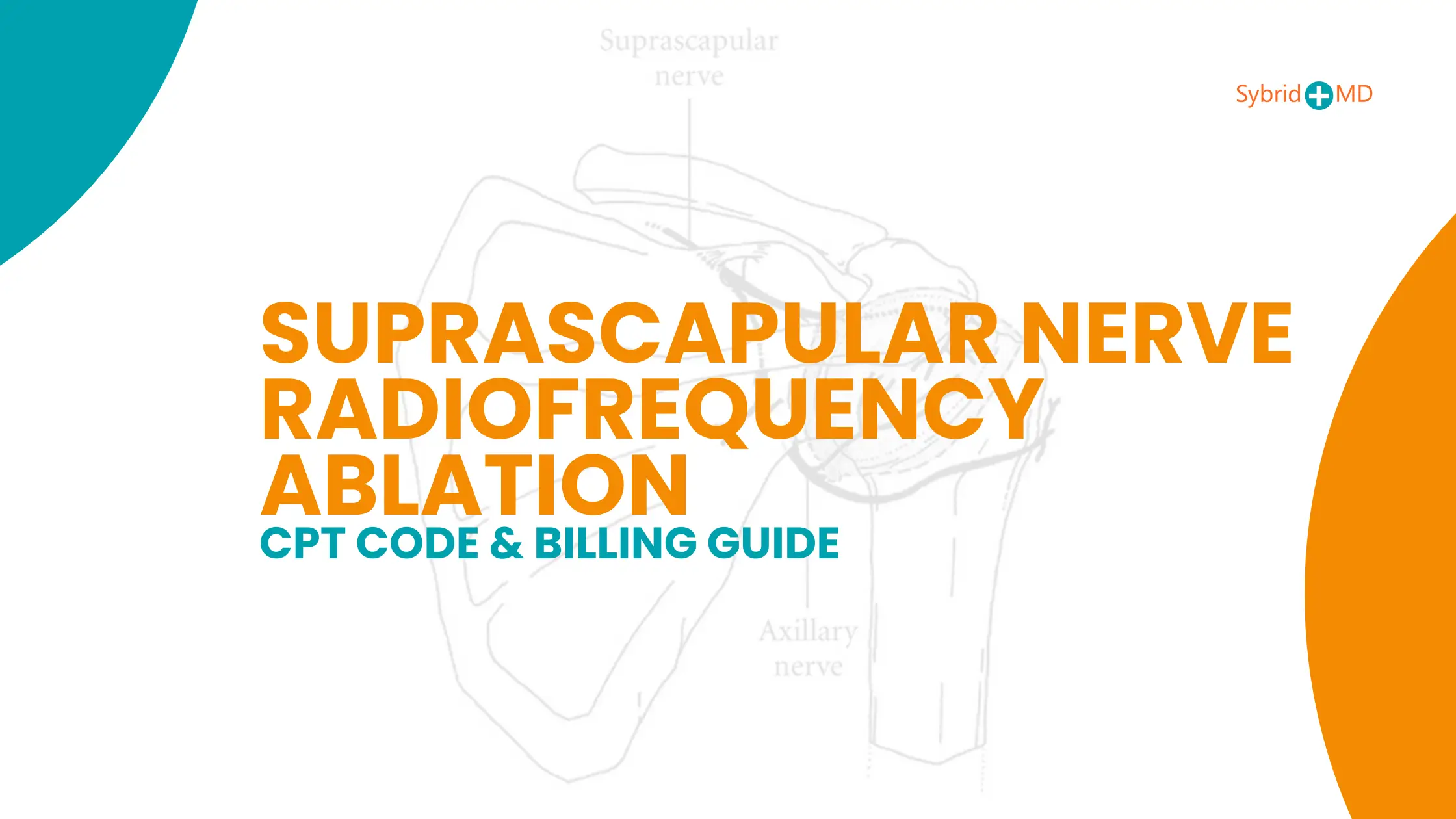Healthcare practitioners perform suprascapular nerve radiofrequency ablation as an important medical intervention to handle enduring shoulder pain incidents in patients who experience shoulder joint instability and rotator cuff injuries. Shoulder pain that persists could reduce a person’s quality of life to a significant extent. The medical field provides two main strategies to handle this pain through the implementation of suprascapular nerve radiofrequency ablation and nerve blocks.
The popularity increase of this treatment warrants proper coding for reimbursement along with accurate documentation to maintain quality patient care. This piece provides complete information about the CPT code for suprascapular nerve radiofrequency ablation while presenting its clinical applications and relationship to suprascapular nerve block procedures.
Suprascapular Nerve Anatomy and Function
The suprascapular nerve stems from the upper trunk of the brachial plexus before innervating both supraspinatus and infraspinatus muscles. The shoulder requires these muscles to perform movement functions and maintain stability. The joint sensory function of the nerve indicates it should be considered when planning pain management strategies.
What is the difference Between Suprascapular Nerve Block and Suprascapular Nerve Radiofrequency Ablation?
The suprascapular nerve block functions through local anesthetic numbing, whereas suprascapular nerve radiofrequency ablation affects the nerve structures permanently.
Suprascapular Nerve Block:
Local anesthetic administered through nerve block induces temporary blocking sensation to the nerve. A nerve block does not create long-term changes to pain signal transmission by the nerve. Duration between pain relief and return of sensation varies from weeks to hours based on both the anesthetic patient response and anesthetic type. The diagnostic procedure helps verify suprascapular nerve as the origin of pain.
Suprascapular Nerve Radiofrequency Ablation:
Radiofrequency ablation provides a more permanent therapy plan compared to other options. Radiofrequency energy disrupts the pain signaling ability of the nerve which produces extended pain relief effects. Medical staff perform this procedure after a patient gets pain relief from a nerve block because the anesthetic effect ends. Radiofrequency ablation provides sustained relief from pain, which extends between several months and multiple years, thus becoming an ideal medical procedure for managing persistent pain.
Symptoms for Suprascapular Nerve Radiofrequency Ablation
The medical procedure of suprascapular nerve radiofrequency ablation becomes an option only after other treatment methods fail to provide relief. RFA works best for individuals who experience chronic shoulder pain, in addition to rotator cuff tear patients, among others.
- Rotator Cuff Tears: The rotator cuff muscles experience debilitating shoulder pain because of sustaining damage. The treatment by RFA goals to decrease shoulder pain for patients with suprascapular nerve damage through focused nerve intervention.
- Shoulder Instability: Other medical interventions fail to relieve ongoing shoulder dislocation or subluxation pain for affected patients. Through RFA medical professionals can help patients overcome their shoulder pain while obtaining better life quality.
- Arthritis: Osteoarthritis, along with inflammatory arthritis in shoulder joints, creates painful symptoms that become very difficult to manage. Radiofrequency ablation serves as an extended-term therapeutic approach to attack shoulder joint pain.
- Frozen Shoulder: Frozen shoulder or adhesive capsulitis describes a condition that affects the shoulder joint through restriction and intensive pain. The medical procedure RFA proves effective at treating shoulder pain in patients.
The patients who show the best results from this treatment have localized pain areas and have failed to find relief from physical therapy along with medications and corticosteroid injections.
Suprascapular Nerve Block Cpt
A suprascapular nerve block requires the CPT code 64418 (Injection, anesthetic agent; suprascapular nerve) as per source34. One resource incorrectly attributes the procedure code as 64450 for this specific procedure despite its inaccuracy compared to the appropriate code 64418.
This treatment approach functions mainly for diagnostic needs and short-term pain management of shoulder pain in patients. The interruption of nerve function assists in determining the suprascapular nerve as the cause of discomfort so healthcare providers can develop appropriate treatment plans. The block helps establish a diagnosis when physicians consider it before making a decision to perform suprascapular nerve radiofrequency ablation, which uses CPT code 64640.
Procedure Details
- Technique: Health professionals use ultrasound combined with fluoroscopic guidance to accurately position the needle adjacent to the suprascapular nerve during this procedure.
- Indications: This method serves as a therapeutic option for persistent shoulder pain that persists beyond usual treatment approaches.
- Benefits: The procedure both brings fast pain relief and allows healthcare professionals to check for suprascapular nerve involvement as the pain source.
Billing and Coding Considerations
- Modifiers: The primary code requires the addition of modifier -50 for all bilateral procedures to show the bilateral nature. The implementation of modifier -59 indicates when a nerve block functions as an independent procedure different from other treatments1.
- Coverage: Suprascapular nerve blocks need Medicare coverage by meeting two vital requirements that need prior authorization and failed pharmacologic therapy documentation
Medical practitioners must show accurate coding techniques when performing suprascapular nerve procedures
Providing healthcare providers with appropriate reimbursement from correct coding reinforces their ability to keep advanced pain management options accessible for all patients. A proper understanding of CPT codes alongside their relationship to clinical care quality enables medical providers together with patients to maintain an efficient healthcare process.
Cpt Code For Suprascapular Nerve Radiofrequency Ablation
Medical codes do not have an established entry for suprascapular nerve radiofrequency ablation procedures. Healthcare providers should perform billing with CPT code 64999 (Unlisted procedure, nervous system) when the procedure lacks a specific code. The consultant should consider using CPT code 64640 (Destruction by the neurolytic agent: other peripheral nerve or branch) for peripheral nerve destruction, while this code does not specify radiofrequency methods as the treatment protocol.
Clinical Outcomes and Safety
Medical evidence demonstrates that suprascapular nerve RFA effectively decreases pain severity while enhancing shoulder joint movement. Medical studies demonstrated that suprascapular nerve RFA produces limited safety issues resulting in minimal adverse effects during treatment and afterward.13 Additional research must be conducted to establish complete knowledge of how well this treatment works in the long term and what potential risks exist.
Benefits and Risks of Suprascapular Nerve Radiofrequency Ablation
Suprascapular nerve radiofrequency ablation treatment features both beneficial aspects and possible safety hazards like any medical intervention.
Benefits:
- Long-term Pain Relief: The main benefit of RFA procedures is their extended pain relief duration which extends from months to potentially years thus avoiding further intervention needs.
- Minimally Invasive: Suprascapular Nerve Radiofrequency Ablation involves a minimal invasion because it has few potential complications while patients experience a short recovery period.
- Improved Quality of Life: RFA reduces chronic pain which results in significant improvements for patients in their day-to-day activities and complete well-being.
Risks:
- Infection: Any invasive medical procedure comes with minor risks of infection that affect the area where the needle enters.
- Nerve Injury: The procedure presents a minor possibility of damage to the adjacent tissues or nerves, but this risk remains quite uncommon.
- Temporary Pain: The patient’s pain level sometimes intensifies during the first days afterward before the nerve pain transmission abilities completely stop.
Conclusion
The treatment method of suprascapular nerve radiofrequency ablation provides long-term relief to patients dealing with persistent shoulder pain when other treatment approaches have failed to help. The CPT code 64640 represents suprascapular nerve radiofrequency ablation and serves as a vital element for correct documented procedures and payment processes. Documentation of suprascapular nerve block procedures depends on understanding CPT code 64450, which distinguishes diagnostic procedures from therapeutic procedures.
Effective coding practice enables appropriate financial reimbursement for medical professionals working with patients who have chronic shoulder pain because this support allows continued access to beneficial treatments. Long-term musculoskeletal pain management will continue to rely on radiofrequency ablation treatments because medical technology advances to benefit patients with debilitating conditions.
FAQs
What is the CPT code for radiofrequency nerve ablation?
The procedure of radiofrequency nerve ablation requires the use of CPT code 64640. Radiofrequency energy serves as the neurolytic agent to destroy the suprascapular nerve based on the CPT code 64640 for treating shoulder pain. The procedure requirement exists when imaging technology tracks the precise location of the nerve before treatment.
What is a radiofrequency ablation of the suprascapular nerve?
Healthcare providers use radiofrequency ablation of the suprascapular nerve as a minimally invasive procedure where radiofrequency energy generates heat lesions on the suprascapular nerve to prevent the transmission of pain signals. The treatment delivers benefits by decreasing persistent shoulder pain in both rotator cuff tear patients as well as those with arthritis.
What is the CPT code for suprascapular nerve?
The medical procedure for suprascapular nerve block uses CPT code 64418 to define the service. This code refers to an injection of an anesthetic agent into the suprascapular nerve
What does the CPT code 64640 mean?
The procedure involving radiofrequency energy to eliminate the suprascapular nerve has its own CPT code 64640. The pain management procedure introduces nerve-disrupting methods to block pain signals created by the nerve pathway. A proper needle placement requires imaging guidance from fluoroscopy or ultrasound during this procedure.

